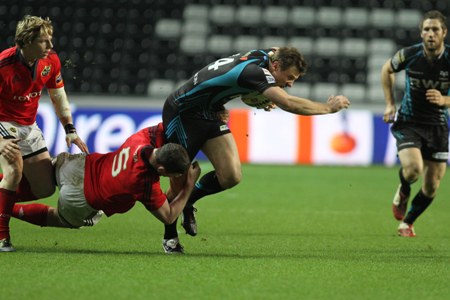The 19 either under treatment or on national duty included a dozen internationals. Huw Bennett, Ryan Bevington, Ian Evans, Justin Tipuric, Ryan Jones, Dan Biggar and, of course, Shane Williams had all played that afternoon against Australia, a fund-raiser which also doubled up as the little wizard's farewell to Test rugby.
Three more involved in the World Cup adventure - Adam Jones, Alun-Wyn Jones and Paul James - sat the weekend out in varying stages of recovery from different injuries. Another recent casualty, Samoan scrum-half Kahn Fotuali'i, was also a non-starter along with Nikki Walker, the Scotland wing still in the throes of recovering from the knee operation which put him out of the World Cup.
A 13th international, Tom Prydie, was otherwise engaged with Wales on the global sevens circuit all of which left the Ospreys no option but to rely on a mixture of young and old from their shrunken list. Shane's tears over his fairytale exit from the international arena had barely stopped flowing before the makeshift Ospreys went to work, aware of how their capital rivals, the Blues, how suffered in Dublin the previous night.
They would have found the going tough against Leinster with a full complement of internationals. Wales required seven of Cardiff's finest against the Wallabies but the loss of such big-hitters as Jamie Roberts, Sam Warburton and Bradley Davies, hardly excused the result. Leinster's 52-9 romp made it the biggest beating the Blues had taken since the Celtic League began eleven seasons ago.
Twenty four hours later, the Ospreys had put that result in perspective. None the worse for slashing their wage bill with the cross-Channel transfers of Lee Byrne, Mike Phillips and James Hook, they responded to local difficulties by dredging up a 19-13 win built on backbone and fighting spirit.
Matthew Morgan, Biggar's teenage replacement at fly-half, headed a clutch of young players, amongst them a trio of 21-year-olds in Ashley Beck, James King and Joe Rees. Ian Gough, 35, and Duncan Jones, 33, dug in for a tough night's work in the tight-five which became infinitely tougher when Munster summoned Paul O'Connell to the front for the second half offensive.
Tries from Richard Fussell and Rhys Webb having taken the Ospreys into the lead, they then survived a late onslaught by which time the ageless hooker Mefin Davies, in his 40th year, had been called off the bench into the eye of the storm. The besieged Welsh region refused to buckle during a series of late five-metre scrums.
For once, Munster were unable to engineer the converted try which would have given them another late win to follow those in Europe against Northampton and Castres, their cause not helped by Scottish referee Peter Allan's decision to penalise them during one of the set-pieces when the Welsh barricades came close to capitulating.
The champions were still wondering why when they ran out of time with nothing more than a losing bonus point to show for their labour. In the circumstances, the Ospreys' preservation of their unbeaten RaboDirect home record will give them more satisfaction than any of their previous wins at the Liberty Stadium.
Now that they are free of international calls, if only for the next month or so, they will head for Wembley and the resumption of their European Cup campaign against Saracens on Saturday. A win over the English champions would give them every chance of topping their pool and surviving the New Year trip to Biarritz where the Basques are more concerned about avoiding relegation from the Top 14.
Munster, their night in Swansea made all the more costly by Doug Howlett's Achilles tendon damage, return to South Wales on Saturday without their All Black wing, for a tie some twelve miles down the road at Llanelli. The first of their back-to-back matches against the Scarlets ought to decide which of the hitherto unbeaten contenders top the most demanding of the six pools.
The first Irish team to win the Heineken Cup twice, Munster have been to Llanelli with mixed results. They lost the trophy at Stradey Park in a quarter final during the spring of 2007, a setback avenged to some degree the following season shortly before the famous old ground closed its doors for good.
On the same December weekend four years ago, Ronan O'Gara navigated Munster through the high winds and teeming rain for David Wallace and Marcus Horan to score the tries in a 29-16 win. Since losing their first Heineken final there to Leicester, Wales has been a happy hunting ground for the Red Army, notably the winning Millennium Stadium finals against Biarritz and Toulouse.
As for Saturday, head coach Tony McGahan knows it will take more than fond memories if Munster are to reach the sanctuary of Thomond Park for the return with their unbeaten status intact.














